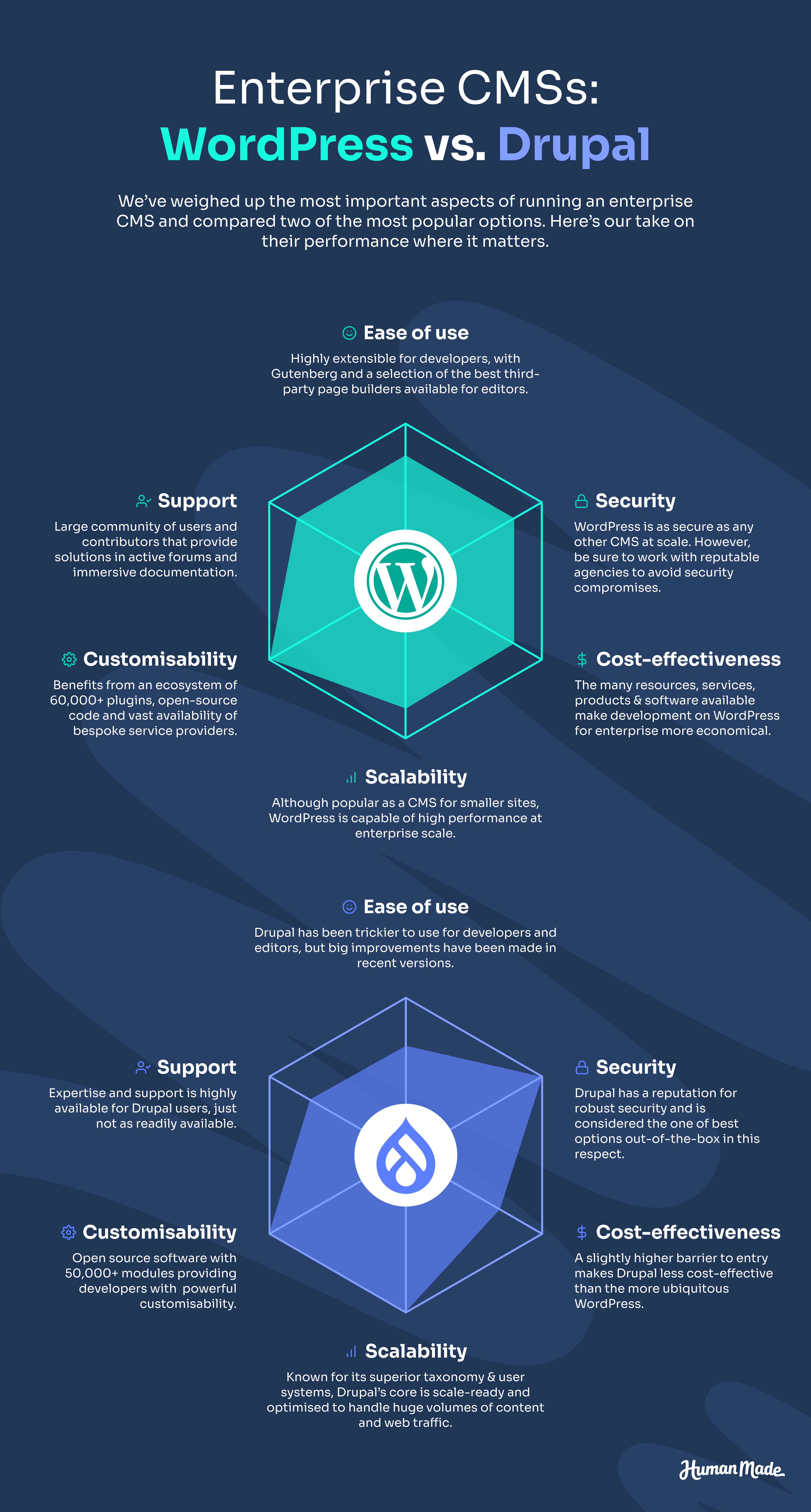Both are open-source software. Both are written in PHP. And both are capable of running high-traffic, enterprise websites. However, WordPress and Drupal are CMSs with different strengths and weaknesses, and it’s important to know which serves your needs best, especially if you’re running a website for an enterprise organisation.
The reality is that the requirements of an enterprise website are going to be considerably different to most other types of sites. They can be characterised by things like:
- High traffic volume – this could potentially be vital for revenue streams like advertising or eCommerce.
- High publishing volume – many enterprise sites publish a lot of content, often, requiring a smooth editorial experience.
- High user count – writers, editors, designers, marketers, journalists, researchers… There are frequently many people using the CMS to keep the content machine running.

Let’s take a look at each CMS before comparing them side by side against the features that matter most for enterprise:
WordPress background: from blogs to big business
WordPress is by far the most popular CMS in the world and is used as the foundation of websites great and small.
What started as a humble blogging platform back in 2003 has become much more than just a place for the everyday musings of the average internet user. Created by Matt Mullenweg and Mike Little, WordPress is now the CMS of choice for a huge portion of the web because of its ease of use and flexibility. This includes the websites of some of the world’s largest brands, like Fortune, The New York Times, and Sony Music. The WordPress core is open-source software supported by a huge community of contributors, made up of developers, translators, writers, event organisers, and more.
Because of its background, WordPress is sometimes deemed unviable CMS at the enterprise level. This couldn’t be further from the truth – WordPress shouldn’t be underestimated as one of the most powerful options for enterprise web development. With a huge ecosystem of plugins to extend the WordPress core functionality, tools, themes, and a massive community of expert developers and practitioners, the resources available for building a high-performing, highly secure enterprise website are vast.
Key CMS info:
Plugins: 60,000+
Themes: 31,000+
Noteworthy high-traffic websites:
Drupal background: modularity and scale
Drupal’s history as a content management system extends back prior even to WordPress’ origins with a 2001 initial release date. Like WordPress, its original intended purpose was a little different: Drupal started as a message board, written by Dries Buytaert to communicate with his friends while working on his master’s degree at the University of Antwerp. It is branded as a “modular CMS”, and, like WordPress, is written in PHP. It’s popular for giving developers the ability to leverage a flexible taxonomy system that is ideal for organising vast and complex volumes of content as well as establishing specific user permission controls.
The Drupal community has more than 1.39 million paying members, made up of 124,000 active contributors, helping drive development forward of one of the most popular alternative CMSs.
Key CMS info:
Modules (plugins): 49,000+
Themes: 2,500+
Noteworthy high-traffic websites:
WordPress vs. Drupal for enterprise: which is the better option?
When it comes to high-traffic websites, there are certain CMS features that stand out as priorities to assess. Here’s how WordPress and Drupal hold up against one another:

Ease of use
Quality of user experience for content management, production and development
WordPress
Much of WordPress’ popularity stems from its ease of use for the end user thanks to innovations like Gutenberg, third-party page builders like Elementor and the general extensibility of its core functionality.
Drupal
Drupal does not offer as rich an outright user experience as some alternatives, but it’s improving. Developers have struggled with the interface in the past, and content teams have had to work with a lacklustre editor, but progress has been made on more recent releases with improvements to WYSIWYG editor options.
Security
Level of security offered for enterprise-scale websites
WordPress
The fact that WordPress builds often utilise more third-party plugins can mean poor development can expose it to more threats but doesn’t mean it can’t be built equally as secure. At the enterprise level, these concerns become less relevant when working with developers and agencies who implement diligent systems to mitigate any security weaknesses.
Drupal
Drupal does not offer as rich an outright user experience as some alternatives, but it’s improving. Developers have struggled with the interface in the past, and content teams have had to work with a lacklustre editor, but progress has been made on more recent releases with improvements to WYSIWYG editor options.
Customisability
Resource availability to extend and build on top of the CMS core
WordPress
The vast ecosystem of third-party resources for WordPress is by far the strongest on the market, making WordPress super flexible and customisable. There are now more than 60,000 plugins available to WordPress for developers and designers to use as starting points. With a greater number of bespoke service providers available as well, extensibility is easier on WordPress than on any other CMS.
Drupal
Drupal does not offer as rich an outright user experience as some alternatives, but it’s improving. Developers have struggled with the interface in the past, and content teams have had to work with a lacklustre editor, but progress has been made on more recent releases with improvements to WYSIWYG editor options.
Scalability
The CMS’s ability to sustain its performance as a website scales in size
WordPress
WordPress has proven time and time again to be highly effective in terms of scalability. It can handle tens of thousands of logged-in users at a time while smoothly delivering hundreds of millions of page views to a single site every month.
Drupal
Thanks to its superior taxonomy and user systems, Drupal is considered one of the best options in terms of scalability because of the core software’s ability to handle large volumes and varieties of content out of the box.
While both WordPress and Drupal can handle huge volumes of content and activity, Drupal is better for when you have more types of content.
Cost-effectiveness
Economic viability of developing enterprise websites on the CMS
WordPress
There are many services, products, and businesses dedicated to enterprise WordPress development to help you achieve your goals with budget flexibility. Builds can be as sophisticated or simple as required, so cost-effectiveness at scale is a benefit of WordPress. Its ease of use also helps lower development costs.
Drupal
No enterprise build is cheap, but Drupal’s higher barrier to entry and more challenging user experience play a part in making Drupal projects generally more expensive.
The more limited supply of Drupal expertise compared to WordPress also drives costs up.
Support
Availability of resources to overcome difficulties when using the CMS
WordPress
The huge global community of WordPress makes it easy to find help for anything you need. From active forums, channels and immersive documentation, to countless agencies and freelancers, it’s hard to not get the help you need for WordPress.
Drupal
Drupal has a similar network of contributors, users and documentation to find support for difficulties, just a little smaller. You will not have trouble finding expertise for Drupal, just be prepared for a little more difficulty.

Human Made has been building, maintaining, and migrating enterprise WordPress sites for more than a decade. Get in touch with us to see how we can help you.
